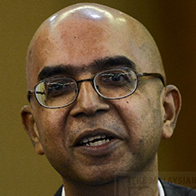A reader commented on my last article, remonstrating that I should not have chosen the Indian judiciary as a model of judicial activism. His objection was rooted in the weaknesses of the Indian judiciary, including allegations that they are corrupt and selectively inefficient.
 Another reader wondered how the writs of the judges could be complied with if those whom the judges ordered to comply didn't participate in selecting the mandates.
Another reader wondered how the writs of the judges could be complied with if those whom the judges ordered to comply didn't participate in selecting the mandates.
I chose the Indian judiciary because many Malaysians visit India regularly, and are aware of that nation's progressions and regressions.
Many Malaysians are aware of the 21-month emergency declared by then prime minister Indira Gandhi in June 1975.
The Emergency was one of Indira's responses to the Supreme Court's allegedly activist ruling in 1973 that the Legislature cannot enact laws which restrict constitutional guarantees of freedom – recall the "basic structure doctrine" which I wrote about earlier.
Also, because of (1) the vastness of injustices in India, (2) the criminalisation of politics (one in three MPs have criminal cases against them), and (3) the paralysis of the political system due to grandstanding instead of governing, the Indian judiciary can supply far more examples of judicial activism than other judiciaries.
However, my reading and my explorations with friends who are trained in the law leads me to think few would disagree that the best known activist judge is Lord Denning.
For 20 years from 1962, Denning (b.1899-d.1999) was Master of the Rolls: the "third most senior judge in England and Wales". He served as a judge for 38 years.
He served the law for much longer, since he practiced law before he became a judge, and he was a member of the House of Lords after he retired from the bench.
I first heard of Denning from a friend who was studying law. My friend complained that under Denning the law became less predictable, even if more perfect.
Business folk know the importance of the predictability of interpretation of the law. Predictability means "like cases must be treated alike".
If the interpretation of the law is predictable, a case can be won on the basis of a prior decision in a similar case – what lawyers call "precedent".
Predictability assures that parties to a contract won't find it advantageous to turn to litigation to "break" a contract in the hope of getting a better deal in court.
Yet Denning was occasionally willing to disregard precedent. The example which is most often cited to demonstrate Denning's thumbing his nose at precedent is that of a case in which he insisted, contrary to precedents, that a deserted wife had a right to continue occupying the matrimonial home.
The common man loved Denning because he stuck to "perfection", the belief that the common law should protect and indeed help the common man.
But Denning – whom I consider a model – was not without faults. If you don't believe me, you can Google the Guildford Four, Sikhs and turbans, black men and juries.
There is no perfect judge. Predictability is important, but so is perfection. The law must change.
Functional legislatures – let alone embattled and dysfunctional legislatures like ours – take too long to change the law. The British Legislature sometimes takes the cue from judgments.
Therefore, some judicial activism is not a bad thing. Why not take a lesson from India?
I'll now address the second reader's comment: how can actors implement actions if they don't participate in determining them? It is in answer to this question that we see the genius of what the Indian judiciary did.
Indian judges developed a process which requires, before the award of judgment, prior participation and agreement of all the actors who will be required to comply with the judgment. The responsibility for identifying actors and negotiating agreement lies with the amicus curiae, the "impartial adviser to the court", appointed by the court.
So, if you read the judgments of the Supreme Court in cases which fall under the rubric of judicial activism, you will notice sentences like this one:
"[the Solicitor General, appearing for the Union of India] submitted that as a matter of fact discussions held between the representatives of the two governments, namely, Union of India and Government of NCT of Delhi as also the M.C.D. had led to a consensus on five other points also on which this Court could issue suitable directions to help reduce the pollution levels in Delhi."
As a constitutionalist who values predictability, I don't like the activism of the Indian judiciary.
As a practical person who values action, I want an institutional response to political manoeuvring which increases inequality, rabidity and rapacity in society.
We will not find perfection. But if we stop looking for it, we will have despotism or anarchy. – February 17, 2016.
* This is the personal opinion of the writer, organisation or publication and does not necessarily represent the views of The Malaysian Insider.


Comments
Please refrain from nicknames or comments of a racist, sexist, personal, vulgar or derogatory nature, or you may risk being blocked from commenting in our website. We encourage commenters to use their real names as their username. As comments are moderated, they may not appear immediately or even on the same day you posted them. We also reserve the right to delete off-topic comments